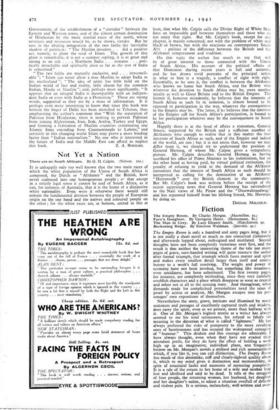Not Yet a Nation
There are no South Africans. By.G. H. •Calpin. (Nelson. cos.)
IT is unhappily only too well known that the two main races of which the white population of the Union of South Africa is composed, the Dutch or " Afrikaner " and the British, have never coalesced into one homogeneous people ; se that except in a strictly legal sense it cannot be said of South Africa, as it can, for instance, of Australia, that it is the home of a distinctive white nationality Even were it -otherwise there would still remain the fundamental division'hetween the people of European origin on the one hand and the natives and coloured people on the other ; for the white races are, at bottom, united in this at least, that what Mr. Calpin calls the Divine Right of White Skin fixes an impassable gulf between themselves and those who do not enjoy that right. But Mr. Calpin's book, except for one chapter, is mainly concerned, not with the problem of white and black' or brown, but with the reactions on contemporary South Afri i politics of the difference between the British and the Afrikaner temperament and tradition.
On this topic the author has much to say that will be of great interest to those connected with the Union of South Africa. His account of the political affairs of that Dominion during recent years is full and accurate, and he has drawn vivid portraits of the principal actors in what to him is a tragedy, a conflict of right with right. Essentially, as he sees it, the conflict is between the Afrikaner who knows no home but South Africa, and the Briton who whatever his devotion to South Africa may be, owes another loyalty as well to Great Britain and.to the British Empire. The former if, however mistakenly, he believes that the interests of South Africa as such lie in isolation, is almost bound to be opposed to participation in the war, whatever the consequences to the Empire may be. The latter, if he believes that the interests of the Empire call for South Africa's participation, is bound to be for participation whatever may be the consequences to South Africa.
Happily there is at the head of affairs a statesman, General Smuts, supported by the British and a sufficient number of Afrikaners wise enough to realise that in this matter the true interests of South Africa as such, and of the Empire and indeed of the world, are one ; but it is not amiss that, however we may differ from it, we should- try to understand the position of General Hertzog, of whom Mr. Calpin gives a sympathetic picture. Mr. Calpin describes General Hertzog AS having sacrificed his office of Prime Minister to his isolationism, but on the other hand as having paid, by virtual political .extinction, the penalty of refusing to yield to the demand of the Afrikaner extremists that the -interest of South Africa as sudh should be interpreted as calling for the domination of an Afrikaner " Herrenvolk " over the British element in the community. But Mr. Calpin's book was written before the receipt of the recent surprising news that 'General Hertzog has surrendered to the Nazi views of Mr. Pirow and the " Ossewabrandwag," and has separated himself from his lifelong friend, Mr. Havenga, by doing so.
DOUGAL MALCOLM.






















 Previous page
Previous page